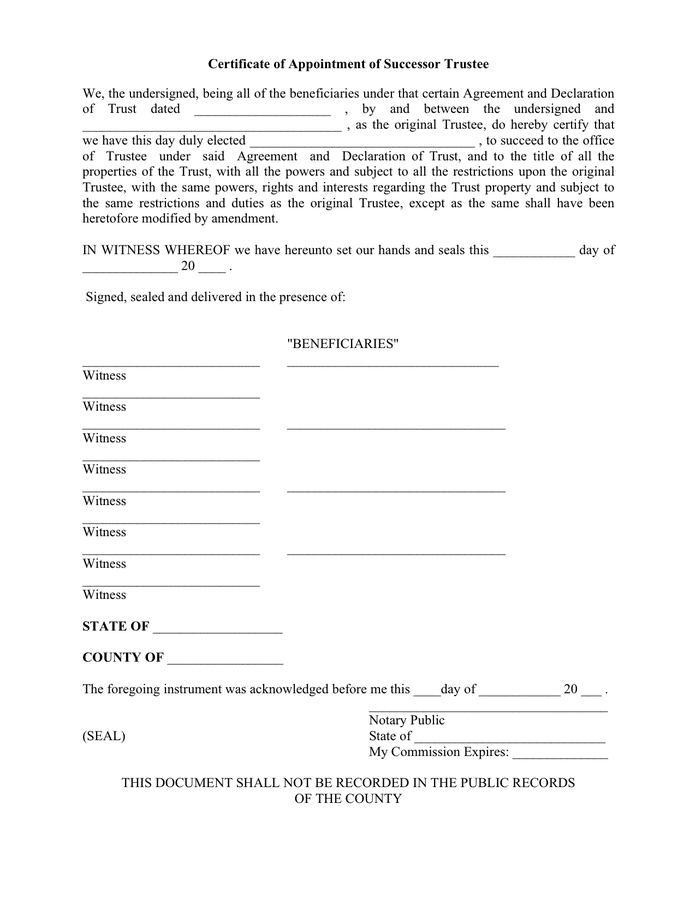When you create your revocable living trust, you must appoint a successor trustee. This is someone who will take over the administration and settlement of your trust after your death. This person would also be called upon to serve if you become mentally incapacitated. So many persons are want to know if a successor trustee can still be a beneficiary and if they can change a trust. So here we’ll discover all about the successor trustee and know the processes involved in documenting the form.
The person creating a revocable trust is frequently the trustee of their accounts. In comparison, an irrevocable trust requires that someone else is assigned to this role. When you are no longer able to manage the trust, a successor trustee is waiting in the wings.
What is the Concept of a Revocable Living Trust?
A revocable living trust, like a will, is an estate planning tool that specifies how the trust’s creator (Grantor) wishes to distribute specific property after their death. A living trust retains property put in it by the Grantor. The grantor who is the original Trustee initially holds the living trust.
Read also: Living Trust vs Will: Best Option in the US
What is a Successor Trustee?
A Successor Trustee is a person in charge of managing the trust after the Grantor dies or becomes “Incapacitated”. The Grantor’s guidelines for how the trust should be handled are outlined in a document known as the “Declaration of Trust“. The Declaration of Trust would also outline the Successor Trustee’s duties and powers.
Naming a Successor
When selecting a successor, make certain that they are capable of carrying out these responsibilities. Serving as a successor trustee is a huge responsibility, and it’s often a time-consuming one. You should be able to select the right person—or name an institution such as a bank—for the job. It is best to consult with an estate planning attorney.
It is also necessary to name one or more “backup” trustees in case your first choice is unable to serve. Don’t name anyone without first speaking with him to ensure he’s willing to accept the position.
Your friend or loved one has formed a revocable living trust and has appointed you as Successor Trustee or Alternative Successor Trustee. We’ve prepared this brief overview to help you understand what this means and to answer some frequently asked questions.
What are the Responsibilities of a Successor Trustee?
The particular duties of a Successor Trustee are determined by the terms of the Declaration of Trust, local law, and whether the Grantor has died or is incapacitated but still alive. The following is a general description of traditional Successor Trustee duties. Please keep in mind, however, that it is usually a good idea to consult with an estate planning attorney to learn exactly what will be needed in your specific case.
It is necessary to remember that Successor Trustees are to manage the trust and use their authority for the good of the trust’s beneficiaries. Unless expressly approved by the Declaration of Trust, successor trustees will not act for their own personal gain.
Duties of Successor Trustees After the Grantor’s Death
If the Grantor dies, the Successor Trustee is generally in charge of winding down the trust by distributing the property it owns in compliance with the Grantor’s orders.
Usually, the Successor Trustee can do the following:
- Inform the Grantor’s family and loved ones of your appointment as a Successor Trustee.
- Make copies of the Declaration of Trust and distribute them to the beneficiaries mentioned on it.
- Get copies of the Grantor’s death certificate. You may need it to demonstrate the Successor Trustee’s legal authority to manage the trust property.
- Gather information about the trust property and take any appropriate measures to secure and protect it.
- Notify the appropriate banks if the Grantor has put bank accounts in the trust so that you can access them.
- Similarly, notify the Social Security Administration, life insurance companies, retirement plans, and any other organizations that will provide death benefits to the Grantor.
- Coordination with the Executor of the Grantor’s Will to pay any outstanding bills and taxes using trust property. Keep receipts for all paid expenses.
- If the Grantor’s Will is a “Pour-Over Will,” consult with the Executor to include the property to the trust as well.
- Distribute the Grantor’s trust property to the beneficiaries named in the Declaration of Trust. Instructions to distribute specific pieces of property to specific beneficiaries should be followed first. Afterward, you can move on to general instructions on how the remaining property should be distributed. (Keep in mind that you may need to hold an estate sale to convert any remaining assets into cash.)
Duties of a Successor Trustee When the Grantor is Incapacitated but Still Alive
In this case, the Declaration of Trust typically directs the Successor Trustee to use trust property to provide for the Grantor’s care and comfort while he or she is still alive. The Declaration of Trust can also direct you to use trust assets to support the Grantor’s family and loved ones.
Similarly to when the Grantor dies, Successor Trustees should typically:
- Inform the Grantor’s family and loved ones that you are the Successor Trustee.
- Gather information about the trust property and take the appropriate measures to secure and protect it.
- Notify the banks and financial institutions that hold any accounts placed in trust so that you can access them.
- Apply for any disability benefits to which the Grantor may be entitled.
- Coordination with the Grantor’s Agents under any Financial or Healthcare Powers of Attorney to conduct the Grantor’s business, pay outstanding bills and taxes, and ensure the Grantor receives the care he or she requires.
- Keep records and receipts for any bills you’ve paid and expenses you’ve incurred while performing your duties.
Do I have to serve as Successor Trustee?
No, naming you as a successor trustee does not obligate you to serve. When the time comes, you can choose whether or not to accept this responsibility. If you decline, the next Alternate Successor Trustee named in the Declaration of Trust will replace you. If there was no specific alternative, the Declaration of Trust should state how the next Successor Trustee would be chosen.
It is necessary to remember that even though you accept your appointment as Successor Trustee, you must not serve in this capacity indefinitely. The Declaration of Trust will specify the conditions under which you will resign as Successor Trustee and select a replacement.
Can a Successor Trustee Modify or Change a Trust?
In general, a successor trustee cannot change or amend a trust. However, upon their death, a successor trustee must take legal title to properties and administer the trust in accordance with its terms. Many successor trustees are the spouses or adult children of the person who established the trust. Oftentimes they indulge in family feuds over who gets what from the estate, and when and how they get it. One of the most frequently asked questions we get as trust lawyers are whether successor trustees can change or amend a trust. Let’s see this topic in detail below.
Will a successor trustee alter the terms of a trust?
No, in general. Most living or revocable trusts become irrevocable upon the death of the trust’s maker or makers. This ensures that if the successor trustee takes over control of the trust, it cannot be changed in any way. The primary responsibility of the successor trustee is to manage the trust in accordance with the overt and implicit wishes of the original trustee.
A successor trustee cannot change or withdraw from an irrevocable trust. They must also never give the impression that they have the authority to do so. A successor trustee effectively acts for the beneficiaries and is responsible for carrying out trust administration in accordance with the trust’s stated provisions.
Can a surviving spouse change or amend a trust?
Sometimes. Sometimes a trust will give a surviving spouse the right to change a trust after the first spouse dies, but this is uncommon. Similarly, a trust may give a surviving spouse or another heir a general or limited power of appointment. This means that they may be able to remove or replace beneficiaries if the trust expressly allows them to. We often handle cases where a stepparent outlives a blood parent as a co-trustee. Thereafter, the step-parent who is the successor trustee then tries to disinherit their trust beneficiary stepchildren. Depending on the facts of the case and the language of the trust, this may or may not be allowed. Consulting a trust litigation attorney is crucial in knowing and enforcing your rights in these cases.
Can a Successor trustee remove a trust beneficiary?
Generally speaking, no. Successor trustees cannot eliminate a beneficiary, reduce a beneficiary’s share, or refuse to make distributions to a beneficiary. They can only do so when the trust document specifically grants them discretionary powers to do so. Also, if they can do so if the document makes a beneficiary’s inheritance conditional upon meeting certain requirements. Then, failure to comply with which gives the trustee the authority to effectively disinherit them.
Can a successor trustee remove a co-trustee?
Most of the time, trust creators name one successor trustee, just to make things simpler and avoid unnecessary disputes. But sometimes, the original trustee will name multiple successor trustees who are to share authority over and responsibility for the administration of a trust. When this is the case, a successor trustee can only remove a co-trustee if they have harmed the trust or engaged in misconduct, negligence, or a breach of fiduciary duty. Trustee breaches are more common than you might think. So a successor with a strong enough case may be able to remove the co-trustee. If a co-trustee is also a beneficiary, they may be stripped of trustee authority but are unlikely to be disinherited.
What if a successor trustee puts undue pressure on the original trustee to make changes?
If there is enough proof or testimony to indicate that a successor trustee used an original trustee’s diminished or debilitated state to manipulate them into making self-serving changes to the trust, heirs might be able to sue the trustee for excessive control. Particularly if there is documentation of disorders like Alzheimer’s or dementia, or if the original trustee was a minor. A successful allegation of undue influence can render any unfavorable adjustments or amendments to a trust null and void.
Read Also: Living Trust: Overview, Cost, Templates
What is a Successor Trustee Form?

Taking care of your properties is a complicated task, and setting up a trust is one way to ensure that your money goes where you want it to go. Unfortunately, they often ignore the Successor Trustee Form. When you die, you must have a Replacement. This critical individual will handle matters for your trust in the same way as an executor of your will handles the distribution of your personal property. We’ll walk you through the successor trustee form and any other necessary paperwork to ensure that someone is there to take care of things when you can’t.
Should I Pay or Not?
Your Successor Trustee may be either a volunteer or a paid employee. It is crucial to assess which is most suitable given the circumstances. When it is a partner or infant, for example, you might not want or need to pay them for their time. Meanwhile, if you hire a specialist to handle the issue, it makes sense to pay them for the work they do on your behalf.
Hiring a specialist is not the same as asking your best friend to take over in your absence. Check the relevant laws in your state, as reimbursement rates can differ from one state to the next. Being charitable has no negative connotations. Bear in mind that the pay scale can have both upward and downward limits.
Is a Successor Trustee Required?
Not all trusts necessitate the appointment of a backup Trustee. The primary distinction is whether the trust is irrevocable or a revocable living trust. Irrevocable trusts are typically more stringent than revocable trusts. However, since each trust is written differently, it is critical to read it carefully and decide the requirements.
Regardless of necessity, it is prudent to choose and develop your Successor Trustee when establishing a trust or taking over a role. While there may be some cases where this is not necessary, it is more likely that you need a Successor. You can consult with a lawyer and have them review the trust paperwork.
Formalities for a Successor Trustee
Creating, filling out, and filing a Successor Form is a simple procedure. The majority of people would rather use a prefabricated version or one made by their lawyer. Fortunately, it is a straightforward text. You will need the Successor’s address, phone number, and full legal name. If you are to pay them, you can provide their social security number for tax purposes. You would need the services of a notary public.
Furthermore, whether you are a co-trustee or there are other grantors, you must have them present to sign. Since these individuals are jointly responsible for the Trust, they must also approve the new Trustee. A Successor Trustee Form is merely a trust amendment. This allows the new (future) ST to be introduced without the need to establish an entirely new trust. As a consequence, the amendment is appended to the end of the original text.
To be true, you must sign the amendment in front of a notary public. The form should clarify who will take over if the current trustee(s) dies or becomes incapacitated, using the details you gathered, such as their name and address listed above. This must be remembered if you want to pay the new Successor.
In addition, the form should contain a statement stating that the amendment supersedes any similar details noted in the original trust document. Finally, you must bind this to the original. Copies of the amended trust should be distributed to all banks and brokerages that deal with the money. If the trust has a committed person or firm, you might also want to file this document with an attorney.
Can the Successor Trustee be a Trust Beneficiary?
It is legitimate to appoint a beneficiary of the trust as successor trustee (someone who will obtain trust property after your death). In reality, it’s very popular.
For Instance: Mildred chooses her only child, Allison, as both the primary beneficiary and the successor trustee of her living trust. Allison uses her trustee power to pass the trust property to herself after Mildred dies.
Can a trustee also be a beneficiary?
The short answer is yes, but there are rules that must be observed and it may not always be advisable for a beneficiary to also serve as a trustee of the same trust. Is having a beneficiary serve as a trustee a wise move? It makes sense to appoint a trust beneficiary as trustee. One benefit is that it is handy.
Can a trustee withdraw money from a trust they own?
Yes, if you are the trustee, you may take money out of your own trust. You could take money out as you see fit or as required since you have an interest in the trust and its assets. Additionally, you can add or remove assets from the trust.
Why do people set up a trust?
If you want to, take into account creating a trust. Make sure that your assets are managed in accordance with your preferences in order to benefit your heirs. Maintain your assets while averting the taxes and probate fees connected with the transfer of assets through a will. Create a tax-benefitted charitable gift.
Can a trustee cheat beneficiaries?
Stealing from a trust is considered a breach of fiduciary duty, which entails acting dishonestly to benefit a person or group and can lead to both civil and criminal proceedings against the trustee. It’s critical to acquire as much proof as you can if you think a trustee is stealing from a trust.
How does a successor trustee take over?
A revocable living trust’s original trustee names a successor trustee to take over when they are no longer able to oversee it owing to their death or incapacity. As soon as the successor assumes control of the trust, they are faced with a broad list of obligations.
CONCLUSION
Choosing anyone to control you or your company’s resources can never be taken lightly. A Successor Trustee is in a position of high trust, and they must always be ready and capable of handling the job with the utmost professionalism. Although the paperwork is easy, the election process is critical to the trust’s future protection.
Successor Trustee FAQs
Can a successor trustee also be beneficiary?
Can the Successor Trustee Be a Beneficiary of the Trust? It’s perfectly legal to name a beneficiary of the trust (someone who will receive trust property after your death) as a successor trustee. In fact, it’s common.
What power does a successor trustee have?
A successor trustee is a person or institution that takes control of the trust assets when the original trustee dies, resigns, or becomes incapacitated. A successor trustee’s primary objective is to properly administer the trust assets according to the trust’s terms and in keeping with fiduciary standards.
What is the difference between a successor trustee and executor?
A trustee is named under a Trust, and an executor is named under the Will – but both are charged with managing and disposing of assets after death. … An executor operates under the supervision of the probate court. A successor trustee is answerable to the beneficiaries of the trust
Can a trustee remove a beneficiary from a trust?In
In most cases, a trustee cannot remove a beneficiary from a trust. … However, if the trustee is given a power of appointment by the creators of the trust, then the trustee will have the discretion given to them to make some changes, or any changes, pursuant to the terms of the power of appointment






